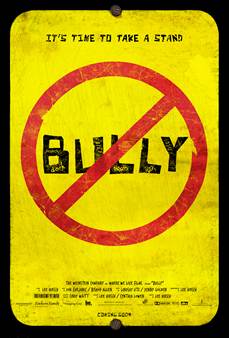Bully
 Bully Directed by: Lee Hirsch Running Time: 1 hr 30 mins Rating: PG-13 Release Date: April 13, 2012 (Chicago)
Bully Directed by: Lee Hirsch Running Time: 1 hr 30 mins Rating: PG-13 Release Date: April 13, 2012 (Chicago)
PLOT: A documentary that tells the stories of American youth who are bullied in their middle schools.
WHO'S IT FOR? Bully is made for both kids and their parents, but will provides little answers about dealing with such problems to either of them. The film's main focus is to share horror stories (which are sadly true) about the damage that bullying does not just to children, but their parents as well.
OVERALL
For a “character-driven drama,” Bully is full of too many weakly developed subjects to squeeze much out of its audience other than relatable sympathy. We watch in anger the episodes of relentless bullying in Alex’s life, but showing a conclusion or a solution to his problems seems out of the question for the filmmakers. In not providing us this satisfaction, Bully fails to provide the simplest of important wisdom it could provide the younger viewers of the film (who, ironically, originally couldn’t even get into some theaters to watch this). That wisdom is this: “High school/middle school is not the end of the world.”
Though the movie features many adults, no one says anything like this. I imagine if the filmmakers had even asked, they would have shared their own stories of the darker moments of adolescence, all of them which would ultimately provide hope, and would enhance the courageous intentions of the film. It's a statement that could be said by anyone who made it through the treacherous social territory of high school/middle school, because it is so damn true.
Formerly titled "The Bully Project," Bully is indeed not a project. Such a title suggests examination, or perhaps even experimentation. This documentary does neither, as it sticks to its message of, “Bullying is bad, okay?” instead of going deep into such a horror. With such access to the school and an appetite to eat up any kid’s story of being bullied, why not talk with an actual bully?
Idiotically, Bully empowers bullies. It leaves them feeling omnipotent and intimidating to the audience, just as we feel about them after they invade our personal space, shove our heads into toilets, etc. The people who pound on Alex, or those who pick on Kelby, or those who drove Tyler to suicide, are hardly explored. The nature of conformity, which seems to be a heavy component to being bullied or not, is left by the wayside. Such ideas are of little interest to a documentary more focused on giving audiences tear swirlies, than thoughtful conclusions about what can be done to save kids like Alex who don’t deserve the terrible things put on them.
Instead, bullies hide in the dark, bounding in our minds like savage beasts with no remorse concerning the domestic destruction they cause. Wouldn’t it have been groundbreaking to see someone who drove a boy like Tyler to suicide try to explain themselves, or even apologize on camera? Is this not the type of arena where the villains should be explored, just as much as their victims? I am sure that material would make for a good documentary.
While this might sound bully-like, the film does feel like it’s basically the Weinstein Company trying to cash in on the rising Twitter hashtag, Youtube video-making hipness of “anti-bullying” campaigns. Lady Gaga seems to take up any cause against bullying, and columnist Dan Savage has created a hopeful campaign that tells us what this movie forgets to: “It gets better.” Outside of promoting a parents’ “Stand for the Silent” cause, Bully offers no such answers or solutions itself.
A disappointing documentary that doesn’t break any new ground, Bully doesn’t dare to delve into villains that can cause waves of emotional turmoil. The film leaves kids and parents scrambling, with more anxieties than before about the power of faceless bullies who lurk in this doc's untraveled territory.
FINAL SCORE: 3/10